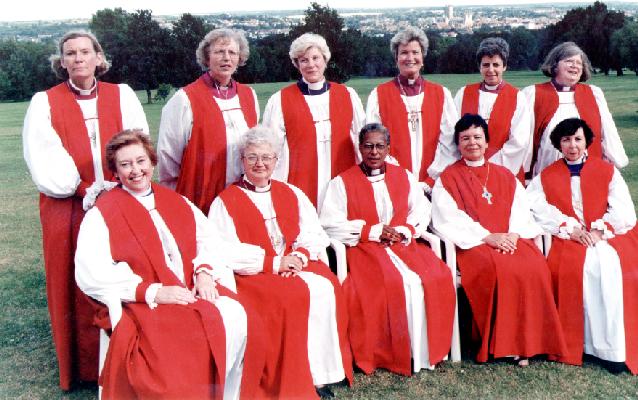UK: Half of women bishops opponents in Synod were women
Almost half of the lay members of the Church of England General Synod who voted down women bishops were themselves women, official voting returns show
A recent Church of England list showed that 33 of the 74 members of the House of Laity who rejected the plan to open the episcopate to women were female
By John Bingham, Religious Affairs
http://www.telegraph.co.uk/news/
November 26, 2012
 According to a list provided by the Church of England, 33 of the 74 members of the House of Laity who rejected the plan to open the episcopate to women were female.
According to a list provided by the Church of England, 33 of the 74 members of the House of Laity who rejected the plan to open the episcopate to women were female.
Women's campaigners rounded on them calling their stance "ridiculous" arguing that those who believe in the idea of "male headship" should have followed the male leaders of the Church and voted in favour.
They also claimed that there had been a deliberate "political" strategy by traditionalists to put up female candidates to the Synod likely to appeal to unsuspecting Church parishioners.
The row erupted as the Church's powerful Archbishops' Council prepares to meet to discuss how to find a fast-track solution to what now amounts to a "constitutional crisis" in the established Church.
It is understood that they will even be discussing radical suggestions to circumvent the General Synod and ask Parliament to use its powers to impose women bishops with the full backing of the Church leadership.
A document being discussed at the meeting makes clear that Parliament does not legislate on the internal affairs of the Church "without its consent".
It has fuelled speculation that the Church leadership could themselves consider asking Parliament to pass a bill allowing women bishops.
One member said: "I full expect the Archbishops' Council to be talking about that, we need to consider that seriously."
A list published by the Church of England names all of those who voted for or against the measure to allow women to become bishops at last week's special session in London.
It names the three bishops who voted against - John Goddard of Burnley, Geoffrey Rowell of Europe and Martin Warner of Chichester - all of whom were expected.
Meanwhile Bishop Peter Forster of Chester and Michael Langrish of Exeter abstained.
But in the House of Laity, the list shows several who are said to have spoken in the pats of their support for "women's ministry" without emphasising their opposition to women becoming bishops.
In total there were 33 women among the laity who voted against, predominantly members of the conservative evangelical bloc who believe in the concept of "headship" - that men are the "head" of both the family and the Church.
April Alexander, a member of the House of laity who voted in favour, said: "There is a massive inconsistency here - how is that a woman who does not have enough 'authority' to become a priest themselves can get themselves on the General Synod and presumes to decide who can be a bishop?
"The absolute nonsense of it."
Christina Rees, another lay member who is also on the Archbishops' Council, said: "I just find it incredible that women who believe in the dubious concept of male headship should then ignore the leadership of their male bishops.
"I just don't understand how they can justify their existence on the General Synod".
Mrs Alexander added: "The other thing that they do is constantly put up these articulate women to speak on their behalf and nobody asks them how this works.
"It is a deliberate political attempt to get sympathy because they are women who supporting this but nobody challenges what right they have to sit on Synod and decide who should be a bishop - it's like they are saying 'I can't be a bishop but I can tell you who should, it's just extraordinary."
But Susie Leafe, one of the leading female opponents, said that "headship" did not prevent her from sitting in Synod.
"Headship is about taking responsibility for the spiritual direction of the Church through teaching God's word and I don't think that we are teaching God's word as we vote."
She added: "The Bible talks about mourning with those who mourn and I hope that's what we have been doing, being alongside those people because they have been hurt."
END













